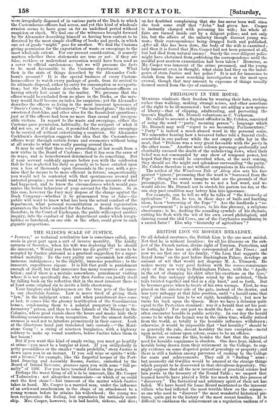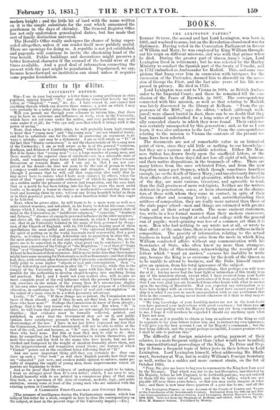BRITISH LION ON MODERN HERALDRY.
OF all deluded creatures, the British Lion is the one most misled: Not that he is without faculties : •for all his illusions on the sub- ject of the French nation, divine right of Toryism, Protection, and so forth, he has been an able correspondent of the Times ; and now we see that one of his family, "the Lion that supports the Royal Arms" on the post before Buckingham Palace, develops an amount of wit that would not disgrace M. A. Titmarsh. He makes merry in very good fashion with the rococo-renaissance style of the new wing to Buckingham Palace, with the "Apollo in the act of changing his shirt after his exertions on the lyre," • and the four unhappy dolphins seized by the architect, "their tails twisted together and tied in a slip knot," and so forth. But he becomes grave when he treats of his own wrongs. First, he was placed on the sinister side of the gate, instead of the dexter, and was very unhappy at that false position, until "a herald came that way," and caused him to be set right, heraldically ; but now he turns his back upon the Queen. Here we have a delusion quite equal to the Protection standard : was it a herald that set his posi- tion straight ? For our part we doubt the fact ; one does not so often encounter heralds in public activity. In our day the herald seems to be what the hermit was in the olden time, wholly retired from the world, so totally is the heraldic influence withdrawn; otherwise it would be impossible that "bad heraldry" should be so generally the rule, decent heraldry the rare exception—metal upon metal, or colour upon colour, ceases to be an offence.
There are reasons for this, besides the fact that the practical need for heraldic cognizance is obsolete. One does hear, indeed, of heralds being drawn from their retirement in the College, to sup- ply evidence on some disputed point of genealogy or property ; and there is still a fashion among parvenus of rushing to the College for coats and achievements. They call it " finding " arms ; but assuredly old Gwillim would be amazed at the strange things which purport to be discovered in that chivalrous depository. One might suppose that all the new inventions of practical science had lain perdu in the treasury of the Round Table ; we suspect that learned heralds have played a little too much with this process of "discovery." The fantastical and arbitrary spirit of their art has faded. We have heard Sir Isaac Heard mentioned as the innocent villain who had inflicted the most terrible blow on the science— as one who used to " discover " the most wonderful historical pic- tures, quite pat to the history of the most recent families. It is difficult to emblazon the achievement on a regulation uniform of a modern knight ; and the little bit of 'card with the name written on it is the simple substitute for the coat which announced the gentleman in the days of chivalry. The General Register Office has not only undertaken genealogical duties, but has made that sort of family distinction universal. The Herald's Office really undergoes the chance of being super- seded altogether, unless it can render itself more publicly useful. There are openings for doing so. A republic is not yet established, and pageants will continue to invite the chastening hand of the true herald. Public buildings and decorations might preserve a better historical character if the counsel of the herald were at all times available. And a good deal of information connecting the present with the past might be popularized. Popularized, we say, because henceforward no institution can stand unless it acquires some popular foundation.



























 Previous page
Previous page